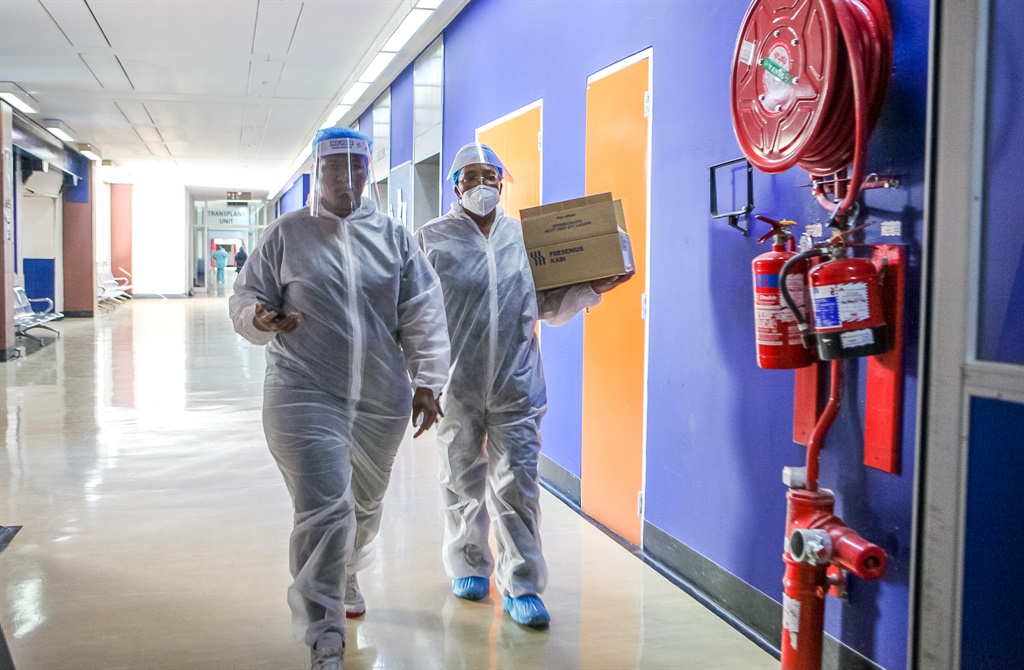
- The Compensation for Injuries and Occupational Diseases Amendment Bill makes domestic workers eligible for claims at the Compensation Fund.
- However, section 43 of the bill prohibits medical service providers from ceding medical invoices to financial institutions or third-party administrators.
- Lobby groups say section 43 will overburden medical care providers and worsen backlogs.
Representatives of injured workers, the medical healthcare sector and domestic workers have warned that a clause in the Compensation for Injuries and Occupational Diseases Amendment Bill runs the risk of worsening the already dysfunctional compensation process and choking healthcare.
Speaking during a virtual webinar on Thursday afternoon, representatives of the Injured Workers Action Group (IWAG), the South African Medical Association (SAMA) and the United Domestic Workers of South Africa union (UDWOSA) warned the amendments would make claims harder.
The Compensation for Injuries and Occupational Diseases Amendment Bill was introduced in Parliament in September by Minister of Employment and Labour Thulas Nxesi. It is currently being considered by the National Assembly, according to the Parliamentary Monitoring Group.
However, section 43 prohibits medical service providers from the ceding medical invoices to any financial institutions and third-party administrators as collateral for working capital, equipment finance or any other operation lending.
IWAG spokesperson Tim Hughes said the Compensation Fund was already dysfunctional and riddled with claim delays and backlogs and that banning the cession of medical invoices to financial service providers would be disastrous for medical and financial providers.
"The fund is dysfunctional. The Compensation Fund system itself and its software was highly dysfunctional for many, many years. It was switched off in August of 2019 and was replaced in October. The new system has been dead in the water with 70% of employers dissatisfied with it," said Hughes.
Hughes said the claims process and the length of time it takes has seen administrators come into the process to assist and they are key to the fund's functioning. But for some reason, Hughes said, the new bill removes their ability to cede claims.
"There is no apparent rationale for this bill. But there is an element of the bill that says it will address corruption. That hasn't developed though. In fact, corruption in the fund can't take place between the administrators and the fund, so there is no evidence the amendments will deal with that," Hughes said.
Hughes said the inclusion of domestic workers for eligibility at the Compensation Fund with section 43 included will only subject an estimated 900 000 domestic workers around the country to crippling backlogs, inefficiencies and corruption in the compensation claims process.
"This has been a great development for domestic workers, but we are very worried that many of us are injured on duty and have not been paid by the compensation fund. Domestic workers cannot claim for themselves. It took eight years to get Maria Mahlangu justice in the courts," said Mashiane.
Mashiane said domestic workers will need administrators and financial service providers in the claims process or they would face delays that many of them literally cannot afford.
"We need a third party to help us deal with these cases. We cannot do it on our own. Section 43 must be erased and removed because domestic workers need to be treated with dignity and equality. We have the dignity of all South African people and are equal to everyone," Mashiane said.
SAMA board member Dr Angelique Coetzee said a variation in IT systems does not accommodate different systems that medical service providers, nurses, and physiotherapists, which is why administrators are useful.
"When I first became an administrator, it was easy to process claims. There was not a delay in receiving money. Employers also knew how to fill in the forms and everyone was happy. Then came the late nineties where we had trouble with forms and employers didn’t have all the details," said Coetzee.




 Publications
Publications
 Partners
Partners












